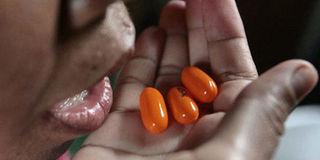Abuse of post rape drugs worry medical experts

A HIV patient taking her daily dosage of antiretroviral drugs. Youths and sex workers, it is said, prefer having unprotected sex and then taking antiretroviral drugs to cut the infection risk, rather than use a condom. FILE PHOTO
What you need to know:
- These two groups, it is said, prefer having unprotected sex and then taking antiretroviral drugs to cut the infection risk, rather than use a condom.
- Ms Musyoki warns that prolonged use of the drugs leads to the body developing resistance, thereby rendering them ineffective.
- In the past, sex workers have been urged to use drugs that are taken before exposure to HIV, known as pre-exposure prophylaxis (PrEP), which contain fewer drugs than PeP.
An emerging trend among the youths and sex workers has got health experts worried.
These two groups, it is said, prefer having unprotected sex and then taking antiretroviral drugs to cut the infection risk, rather than use a condom.
Helgar Musyoki, the programmes manager of key populations at the National Aids and STI Control Programme (Nascop), says the number of people looking for the drugs used for post-exposure prophylaxis (PeP) at clinics and pharmacists around the country is worrying.
“The drugs are available, but they should be given only to rape victims and health workers who get exposed to the virus when treating HIV-positive patients,” she says. “But many people go to the clinics and lie that they have been raped, and ask for the drug.”
Such people, adds Ms Musyoki, go to different clinics and pharmacies for the drugs because they know that they are available to anyone who has been exposed to HIV virus.
“It is difficult for the doctors to know the truth, and they are supposed to give them the drugs because every person who has been raped has a right to get those drugs,” she explains.
SUPPRESSES VIRUS
Ms Musyoki warns that prolonged use of the drugs leads to the body developing resistance, thereby rendering them ineffective.
“That is when the drugs stop suppressing the virus and puts the user at risk. When that happens, their bodies become resistant to other antiretroviral drugs,” adds Musyoki.
According to the World Health Organisation (WHO), PePs can suppress new HIV viruses in the body if taken within 72 hours of exposure.
Sex workers say they engage in unprotected sex because clients pay more when they do not use condoms.
Janerose Wabwire, a sex worker who lives in Kariobangi in Nairobi and operates at the city centre, confesses that she has been taking the drugs for the last five months.
“Every morning, I have to take two pills, an emergency contraceptive pill and an antiretroviral drug. I tested negative for HIV in August, so I know this drug helps,” she says.
“When you ask a client to use protection, they pay about a third of what they would pay without protection,” she explains.
MAKING UP STORIES
At Komboni Estate in Kariobangi, she has teamed up with six sex workers so that they can get ARVs from clinics in turns.
“We go to different clinics for the drugs so that the nurses do not discover our trick. The good thing is that by the time you go to a clinic again, they don’t remember you, or you find a different nurse.
And we have to change the story all the time. One time you say a condom burst. Next time you say you were raped. We just make up stories,” she reveals.
However, they sometimes buy the drugs from chemists in the central business district.
According to reproductive health expert Dr Joachim Osur, repetitive use of PePs is not advisable. Apart from making the body resistant to treatment in the future, they encourage sex workers and the youth to have unprotected sex.
“Apart from HIV, there are many other diseases that result from reckless sexual behaviour, one of them being the Human Papilloma Virus (HPV) that causes cervical cancer” he warns, adding that condoms remain the most effective method of preventing HIV, sexually transmitted infections and pregnancy.
In the past, sex workers have been urged to use drugs that are taken before exposure to HIV, known as pre-exposure prophylaxis (PrEP), which contain fewer drugs than PeP.





